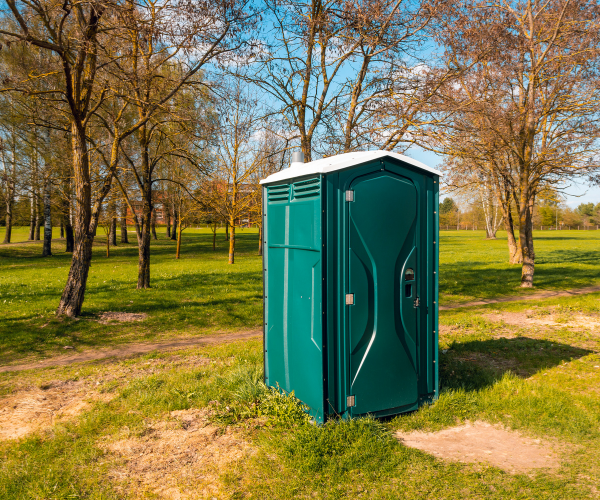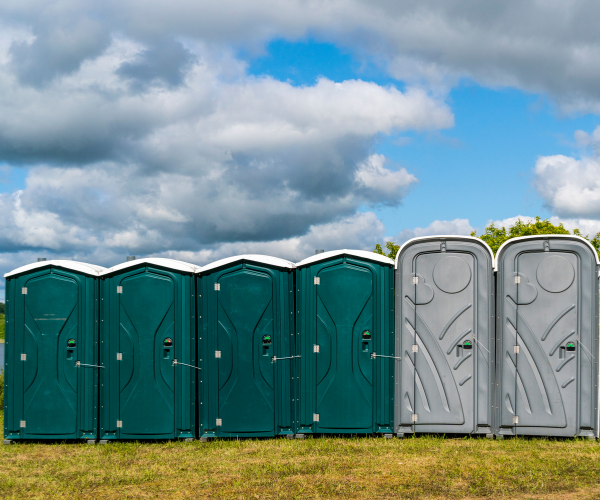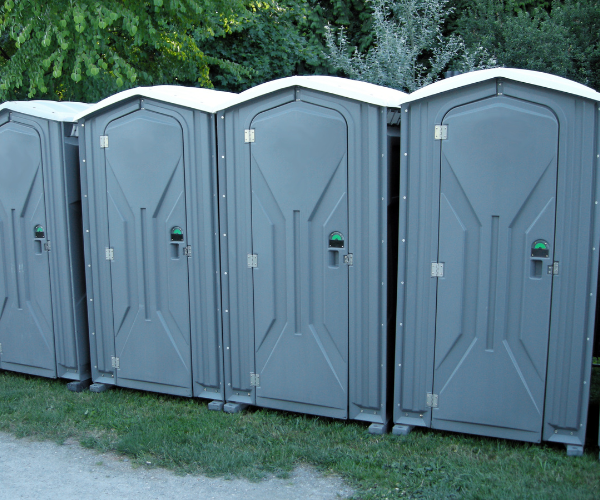Portable toilets offer a myriad of eco-friendly benefits, contributing significantly to sustainable practices. Firstly, they conserve water as these units utilize chemical treatments and don't require flushing, vastly reducing water usage compared to traditional toilets. This conservation is especially crucial in areas where water scarcity is a concern, aligning with environmental goals aimed at resource conservation. Secondly, portable toilets decrease the risk of contamination in natural surroundings by providing a contained environment for waste, preventing it from entering the soil or water systems. Their design effectively manages human waste, mitigating the spread of pollutants and pathogens into ecosystems. Moreover, the maintenance process of these toilets involves waste removed by professionals, usually transported for proper treatment and disposal, ensuring environmental regulations are upheld and minimizing ecological footprints. Notably, modern portable toilet companies often use eco-friendly cleaning products, further promoting green practices by eliminating the use of harsh chemicals. This alternative not only caters to preserving nature but also enhances user safety with less exposure to potentially toxic substances. Additionally, the materials used in constructing portable toilets are increasingly derived from sustainable sources, aiding in reducing plastic waste and improving overall recyclability, which benefits environmental health. Lastly, companies offering these services often optimize delivery and pickup routes to lessen their carbon footprint, thereby reducing fuel consumption and related emissions. In sum, the adoption and utilization of portable toilets represent an important step towards balancing human activity with environmental stewardship, making them an integral component of eco-conscious event planning and management.

Portable Toilet Rentals in Henagar, Tennessee
Call today for a free quote (423) 719-5081
Portable Toilet
Fast, Easy, & 100% Free To Get Started
30 Years of Experience
With over 30 years of experience, we proudly serve Henagar, known for our excellence. Our deep community roots ensure unwavering commitment to quality and satisfaction for all customers.
Unmatched Quality Service
Experience exceptional service with our portable toilet solutions, meticulously designed to uphold top-tier standards of cleanliness and reliability.
Fast and Reliable Delivery
Our team guarantees prompt, dependable delivery of portable toilet units, enabling you to concentrate on your event as we expertly manage your sanitation needs.
Efficient Portable Toilet Rentals in Henagar
Call for a Free Quote Today
(423) 719-5081
Our locally owned portable toilet company in Henagar, Tennessee, stands out for its reliability and dedication to the community. We pride ourselves on providing top-notch, dependable service for a variety of events, including construction sites, parties, festivals, and weddings. Our team is committed to supporting Henagar and nearby areas, ensuring your event runs smoothly with our well-maintained portable toilet units. Our local presence allows us to offer personalized and attentive service, helping us build trust and establish enduring client relationships. We continually strive to exceed customer expectations with our professional and steadfast approach. By choosing us for your portable sanitation needs, you're opting for an honest company grounded in community values, guaranteeing satisfaction at every event.


Standard Portable ToiletOur standard porta john rental units are durable and reliable for any commercial build site, housing development, public works project, or remodel job.Features include dome lighting, grated floors, and an “In-Use” locking mechanism for privacy and comfort.Regularly maintained, inspected, and cleaned by FusionSite at your location.

Wheelchair Accessible RestroomsDeveloped as an alternative to full ADA-compliant restrooms, the Liberty is a spacious, wheelchair-accessible unit that can also be promoted as a family-sized restroom.Includes a patented flat-floor system for easy wheelchair access and maneuverability.Handrails, paper holder, and rotary latch are designed for simple, intuitive end-user operation.

Portable SinkPortable hand washing stations are essential for keeping your work site sanitary and clean.Features hands-free foot pumps, liquid soap, and paper towels.Perfect for job sites without water hookups, these units can handle hundreds of washes between services.
We Proudly Serve
Standard Portable Toilets
Our Standard Portable Toilets provide clean and reliable sanitation options across Tennessee.
High Rise Portable Toilets
Our High Rise Portable Toilets ensure sanitation solutions for multi-level projects in Henagar.
Restroom Trailers
Our Restroom Trailers in Henagar offer luxurious portable restroom facilities for upscale events.
Roll off Dumpsters
Our Roll off Dumpsters in Henagar cater to waste management needs for a variety of projects.
Septic Tank Cleaning
Our Septic Tank Cleaning service ensures efficient and thorough maintenance throughout Tennessee.
Grease Trap Cleaning
Our Grease Trap Cleaning in Henagar helps maintain cleanliness and functionality in commercial kitchens.
Fencing & Barricades
Our Fencing & Barricades service in Tennessee provides secure and versatile solutions for all your events.
Residential Storage
Our Residential Storage service in Henagar offers secure and convenient storage solutions for every need.
Henagar's Portable Sanitation Solutions
Ensuring a seamless experience for portable toilet services in Henagar, we offer a simple and efficient process for obtaining quotes and arranging delivery. Our easy-to-navigate forms, prominently displayed at the top and bottom of each webpage, allow you to enter essential personal details like your first name, last name, phone number, and email. These forms facilitate personalized quotes that match your specific requirements. Strategically placed 'Get A Quote' buttons throughout the website further streamline the process, enabling you to start your rental with just a few clicks. Once you request a quote, our team promptly evaluates your needs and presents a detailed proposal, including available units and pricing. After you approve the proposal, our dependable delivery service ensures the portable toilets arrive at your location punctually, whether for an event, construction site, or other purposes. Our expert delivery team handles all transportation and setup details, providing minimal hassle and maximum convenience for our clients.

Henagar, with its charming local attractions and community events, provides the perfect setting for our Portable Toilet services. Nestled near the scenic DeSoto State Park and the renowned Sand Mountain Potato Festival, Henagar offers a wealth of opportunities for hosting events, and our company enhances these experiences with our exceptional sanitation solutions. Our portable toilets cater to every occasion, ensuring guests can enjoy the event comfortably without concern. Whether it's a local festival, a wedding in the countryside, or any outdoor event, our portable toilets blend seamlessly with the Henagar lifestyle, offering an unmatched level of convenience and reliability. Our units are not only clean but also equipped with the latest amenities to ensure user comfort. As part of the Henagar community, we take pride in adapting our services to the unique characteristics of the area, helping create unforgettable moments for residents and visitors alike. Our reputation in Henagar is built on a foundation of quality service, local engagement, and a deep commitment to contributing to the local economy and culture. We aim to be the top choice for portable toilet rentals by continuously providing high-quality, reliable, and aesthetically pleasing sanitation options that enrich every event and outdoor gathering in Henagar.
Henagar has always been at the heart of our operations, and we strive to be the first choice for portable toilet rentals in the area. Our deep understanding of local needs and preferences allows us to offer a service that is both personal and professional. From construction projects to intimate family gatherings, we have the perfect portable sanitation solutions to meet any demand. Our strong community ties, coupled with years of experience, enable us to provide quick, reliable, and quality services that others can't match. We take pride in being locally trusted and are constantly upgrading our offerings to meet the evolving needs of Henagar residents. Choosing us means you are opting for a provider committed to enhancing the quality of services in our community, ensuring every event or project runs smoothly.
In Henagar and surrounding areas, we pride ourselves on our fast and reliable portable toilet services. Our team ensures prompt delivery tailored to meet your event or construction site's schedule, guaranteeing no delays and seamless setup. Our commitment to efficiency means we work around your timeline, offering flexibility that other companies simply cannot match. Every unit is meticulously maintained and readily available when you need it, ensuring peace of mind for organizers and contractors alike. With our thorough understanding of Henagar's specific needs and preferences, we elevate sanitation services to new standards, focusing on customer satisfaction through every stage of the rental process.
Discover Portable Toilets in Henagar
Renting a portable toilet in Henagar is designed to be as straightforward and hassle-free as possible through our easy-to-use system. To start the process, visitors are encouraged to look for the 'Get A Quote' buttons conveniently placed throughout our website. These will guide you to an online form that collects essential details, including your first name, last name, phone number, and email address. This form ensures we gather all the necessary information needed to process your application quickly and efficiently. You can find these forms both at the top and bottom of our pages, ensuring maximum accessibility regardless of where you are on the site. Once you've submitted your form, our team swiftly reviews the information provided to create a tailored quote specific to your needs. Our experienced customer service representatives are ready to guide you through the selection process, helping you choose the ideal units for your event or project. Upon quote approval, scheduling and delivery details are then finalized in direct consultation with you, ensuring prompt and reliable service. Our delivery team takes care of setup and placement, allowing you to focus on other event elements. With quick and efficient communication lines, our goal is to ensure your renting experience is smooth, customer-friendly, and completed in a timely fashion.
The delivery timeframe for portable toilet orders typically varies depending on the client's location, the type of event, and current demand for units. However, as a standard practice, we aim to provide prompt delivery services to meet all customer expectations timely. Typically, once an order is confirmed, our team coordinates with the client to schedule a convenient drop-off time, ensuring a ready-to-use setup prior to the commencement of any event or construction activities. Generally, we encourage clients to book their units several weeks in advance, particularly during peak seasons, such as summer months when outdoor events are more frequent, and demand increases substantially. By doing so, we can secure the necessary units and arrange for delivery at a time that accommodates the client's timeline. Despite these peak times, we maintain a strong commitment to flexibility and reliability, striving to accommodate last-minute requests if possible. In urgent cases, we prioritize scheduling adjustments where feasible to meet expedited needs. We continuously work to improve our logistics and dispatch processes, ensuring rapid and efficient placement of units at the desired locations, and minimizing waiting periods for our clients. Our dedicated delivery fleet is equipped to handle multiple shipments simultaneously, coordinating routes to enhance efficiency and reduce turnaround time. Communication with clients is prioritized throughout the delivery process, with updates provided to confirm expected arrival windows, giving clients peace of mind and confidence that their sanitation needs are being handled with professionalism. The strategic organization of our services remains vital to delivering excellence, keeping client satisfaction at the forefront of our operations.
Yes, we are fully equipped to service all types of events and construction sites with our extensive range of portable toilet solutions. Whether you're organizing a vibrant festival, a grand sporting event, an elegant wedding, or a corporate gathering, our luxury restroom trailers provide the sophistication and comfort your guests deserve. Our porta potties cater to a wide audience, ensuring accessibility and sanitation. Beyond special occasions, we offer comprehensive services tailored to the construction industry, managing the high demands of work sites with our premium porta potty units and roll-off dumpsters. Our ADA units, portable sinks, and hand sanitizer stations ensure compliance with health and safety standards, guaranteeing cleanliness and user convenience. Additional services include holding tanks and sturdy fencing and barricades, enhancing security and organization. With a reputation for quality and dependability, our mission is to meet diverse client needs seamlessly.

